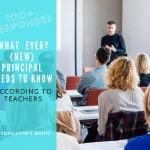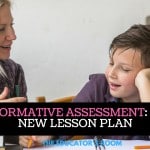Three weeks ago I made the difficult decision to leave my school and accept a 4th grade co-teaching position at another public school just blocks away. When I came back to teaching after a year in grad school, one thing that had changed for me was a deeper commitment to build community within and outside my school. The school where I’ve taught the past 3 years, was a fertile testing ground for this belief. Families were involved in the founding of the school, and family engagement was a central tenet of the school’s overall philosophy and governance.
During my time at this school I practiced home visits, attended numerous potlucks, and worked closely with families to coordinate field trips and class projects. The combination of home visits and close communication while living so close to the school I taught in really did create a deep bond between my students, their families, and me.
I called one student to deliver the news myself. He is a boy that sometimes struggles with the rules of school. He has a wonderful sense of humor that doesn’t always gel with classroom learning, and he can be prone to outbursts when he is feeling embarrassed. We worked hard this past year to build a successful teacher-student relationship. “Mr. Ruben, I’m literally about to cry right now,” he told me in his typical way-too-adult-for-his-age tone. With a large knot in my throat, I promised that we would meet up before the school year started.
So, yeah, leaving was a difficult decision.
I really admire teachers who have taught at one school for their entire careers. After teaching at two separate schools for my first four years of teaching, I had hoped that I had found a school that could be a long-term home. The relationships I built with colleagues and families in just three years made me feel like I was part of more than just a workforce. I felt like I was a part of a community.
Education reform has long focused on the power of teachers. We’ve been highlighted as the single most important school-based factor in student learning. But lately, research and policy making has turned its attention to a concept that teachers have always known: Principals matter.
A good principal can make you feel almost invincible. They can light a spark in you, encourage you to take risks, and nurture your potential. These principals understand that curious and creative teaching leads to curious and creative learning.
Alternately, a principal can make you feel inadequate. They can dull the excitement inherent to teaching and learning. Rather than looking to grow or take the lead, teachers who work for these principals look over their shoulders, anxious of mistakes or failure.
[fusion_builder_container hundred_percent=”yes” overflow=”visible”][fusion_builder_row][fusion_builder_column type=”1_1″ background_position=”left top” background_color=”” border_size=”” border_color=”” border_style=”solid” spacing=”yes” background_image=”” background_repeat=”no-repeat” padding=”” margin_top=”0px” margin_bottom=”0px” class=”” id=”” animation_type=”” animation_speed=”0.3″ animation_direction=”left” hide_on_mobile=”no” center_content=”no” min_height=”none”][bctt tweet=”A good principal can make you feel almost invincible. ” username=”EducatorsRoom”]
As August approached this summer, I felt conflicted. The relationships I had cultivated at my school are invaluable to me. But I realized pride and respect are important as well. All teachers, myself included, deserve to be treated with respect. Without it, I can’t be my best as a teacher. And if my teaching is truly important – to researchers, policy makers, parents, and me – than the principal overseeing my teaching is important too. Leaving my school was a last resort, but it was it felt like the one way I could send this message to whoever was listening.
I made a decision to leave, because as I “grow up” as a teacher, I’m finally giving up the martyr and missionary routine. When I entered teaching as a young, privileged white man coming into the Bronx, I believed it was to “give back” and “close the achievement gap.” I cared for my students deeply, but I also saw them and their community primarily through a lens of deficits. My teaching was in a way defined by the poverty, drugs, and violence that plagued the neighborhood, and by my “goodness” as a teacher willing to work in such a place (and under all the usual conditions we find in high-poverty schools).
Here’s the thing though: Nobody asked me to come to the Bronx and be a martyr. I made that choice. And my teaching and my students were impacted by the mindset.
As writer and educator Clint Smith III wrote in a back to school tweetstorm, when you bring a martyrdom mindset to teaching, “You miss out on the joy the job brings.” Every year of my teaching has been incredibly challenging, but in my early years I definitely missed out on opportunities to feel (and create) joy in my teaching.
I give everything I can to this work. I do it because my students deserve it. I do it because I think it can play a part in dismantling racism and other systems of oppression. But I also do it, because it’s intellectually challenging, immensely rewarding, joyful work. It is a privilege.
I’m not going to give that up that feeling to prove some point about my commitment. I prove my commitment in the same way all teachers do. I make home visits, phone calls, plan lessons, grade student work, and a myriad of tasks that make up teaching. I prove my commitment by making it clear that I’m a professional, not a martyr.[/fusion_builder_column][/fusion_builder_row][/fusion_builder_container]







so why did you leave?